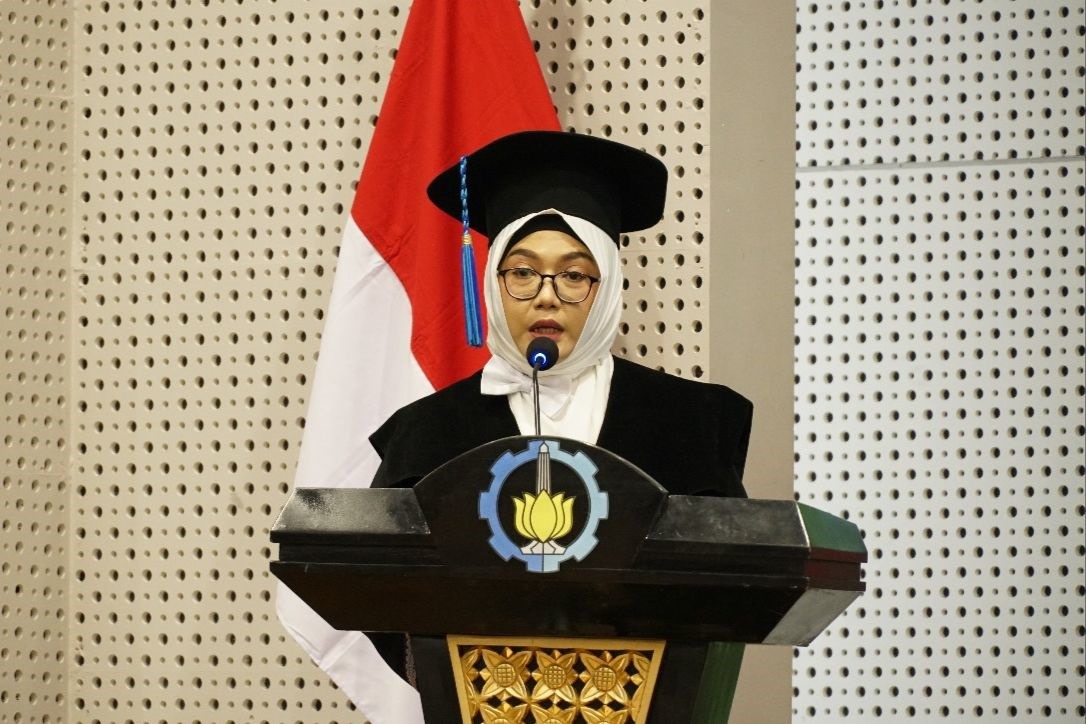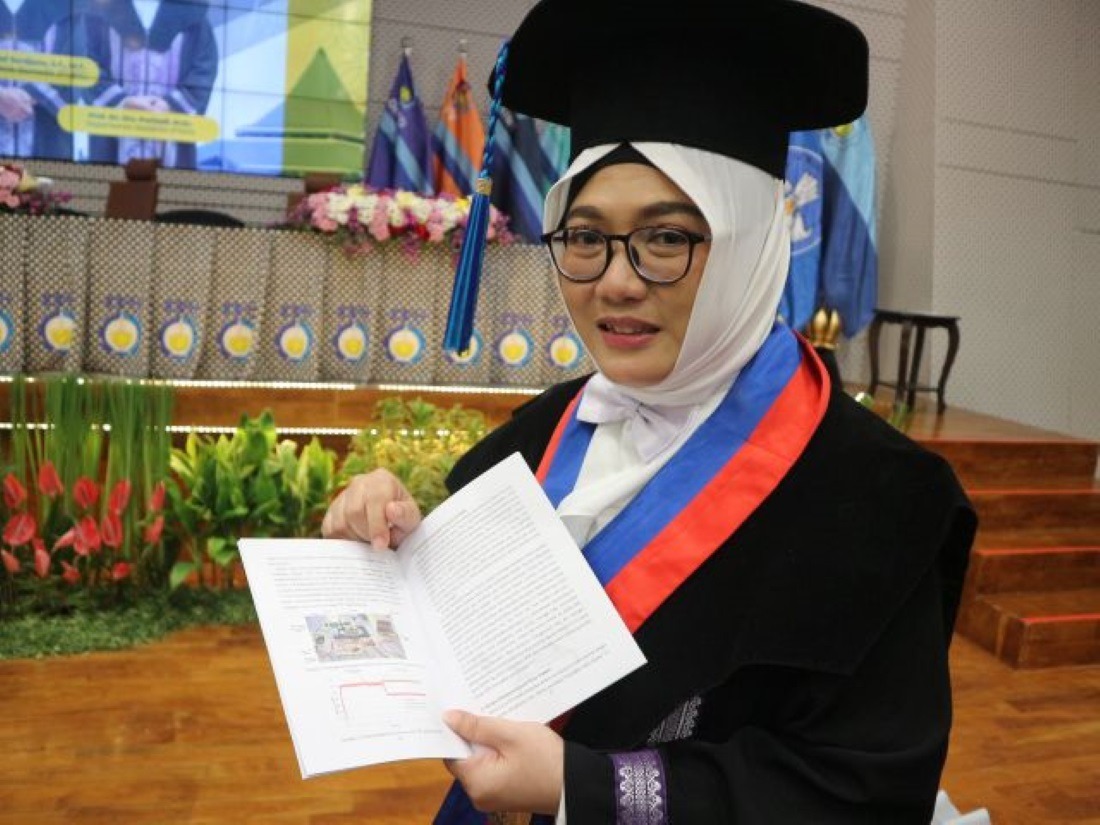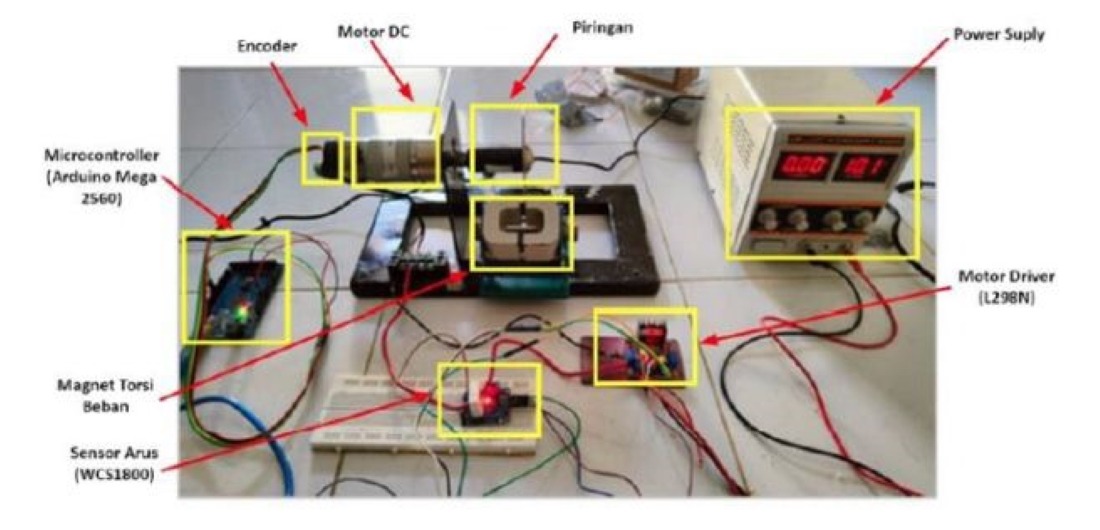ITS Professor Develops Strategy to Increase Availability of Modern Control Systems

Prof Dr Katherin Indriawati ST MT when presenting her scientific oration entitled Increasing Availability in Modern Control Systems
ITS Campus, ITS News – Technological developments have changed various control systems. This is the background for one of the professors from the Institut Teknologi Sepuluh Nopember (ITS), Prof Dr Katherin Indriawati ST MT, to research increasing opportunities for modern control systems to carry out work without failure.
The professor from the Department of Engineering Physics, Faculty of Industrial Technology and Systems Engineering (FTIRS) ITS explained that automation has reduced human involvement in work in the development of modern control systems. This causes unavoidable technical disruptions and obstacles. “There are many risks that will occur if work disruptions are not minimized,” said Katherin.
To minimize this disruption, continued Katherin, modern control systems require high availability. The 164th ITS professor explained that availability is the opportunity for successful work in a system. This increasing opportunity can be measured through several indicators, including component redundancy, diagnostics, hot swapping, online changes, and virtualization.

ITS 164th professor Prof. Dr Katherin Indriawati ST MT shows an illustration of testing tools in his research
The five indicator points were optimized using three strategies developed by Katherin. Through her scientific oration entitled Increasing Availability in Modern Control Systems, Katherin promoted the strategy of sensorless control, Fault Tolerant Control (FTC), as well as fault detection and diagnosis. “A more complex control strategy is needed to ensure the work’s success,” she said.
This ITS Electrical Engineering doctoral alumnus revealed that sensorless control replaces the presence of sensors, usually used to control a process variable. Because it does not use sensors, this strategy requires affordable costs and can be used in difficult conditions. “The indicator point achieved in this strategy is virtualization,” explained the bespectacled woman.
Furthermore, this Jember-born lecturer explained the next strategy, Fault Tolerant Control (FTC), which controls system stability if a component error occurs. In developing this controller, Katherin proposed a new control structure that can determine the type of error so that FTC can be used in sensorless control. “Indicators of component redundancy, hot swapping and online changes can be achieved with the FTC,” she explained.

FTC speed sensorless system testing tool on DC servo motors
The third strategy is fault detection and diagnosis, that utilizes current signals. This woman, Secretary 1 of the ITS Physics Engineering Department, said that current signals can replace vibration signals in detecting system errors. This strategy is carried out to achieve analytical and diagnostic redundancy points. “So that potential system failures can be detected early,” added the mother of one child.
In the research process, Katherin admitted that it took five years to produce results in the form of new knowledge about modern control systems. She underwent various experiments, one of which was the DC servo motor FTC speed sensorless system, to test the effectiveness of the three strategies in achieving points of increasing availability. This 47-year-old woman believes a control system is said to have failed if it does not have a plan to accommodate errors.
Katherine’s research increases the availability of modern control systems and sustainably supports the industrial sector. Increasing availability can help the industry in energy efficiency, minimizing waste and achieving optimal profits. She hopes this scientific concept can develop into broader fields such as social society. “Modern control systems are a technology that implements sustainable solutions in industry and society,” she said. (ITS Public Relations)
Reporter: Aghnia Tias Salsabila
Related News
-
ITS Collaboration with BPBD East Java, Launching VR Disaster Simulation
ITS Campus, ITS News — Supporting anticipation of disasters and continuing to educate the public, Institut Teknologi Sepuluh Nopember
September 23, 2023 14:09 -
Supporting the Implementation of Innovative Ideas, ITS and IYSA Hold International Competition
ITS Campus, ITS News — Institut Teknologi Sepuluh Nopember (ITS) has once again proven its commitment to supporting the
September 23, 2023 14:09 -
ITS Maintains Informative Qualification for Five Consecutive Years at KIP Awards
ITS Campus, ITS News — Institut Teknologi Sepuluh Nopember (ITS) has once again successfully maintained its Informative Qualification predicate
September 23, 2023 14:09 -
ITS Strengthens Smart Eco-Campus through UI GreenMetric 2024
ITS Campus, ITS News — Institut Teknologi Sepuluh Nopember (ITS) has once again demonstrated its commitment to environmental concern
September 23, 2023 14:09
